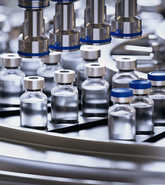Boris Johnson, the U.K. prime minister, has said that his health condition could have gone either way when he was in intensive care with COVID-19. He left the hospital on April 12 after six days, but about one-half of those admitted with COVID-19 to intensive care in U.K. hospitals do not survive. Supportive care, including oxygen, is provided for intensive care patients, but there are no antiviral drugs to help the immune system fight COVID-19.
Two days before the U.K. prime minister was admitted to the hospital in London, Slawomir Michalak, a Chicago factory worker of similar age,was admitted to the University of Chicago Medicine hospital. He had a high fever, was struggling to breathe and was given oxygen. After just two doses of a trial antiviral drug, the oxygen was no longer needed. Thistrial drug was Remdesivir.
About five percent of confirmed COVID-19 cases are severe, requiring intensive care. If only there was an antiviral drug that could significantly reduce the mortality rate of these severe cases, it would have an enormous impact on public perception of the disease. Instead of dread of becoming infected, there would be reasonable assurance that severe infection could be treated.
None of the three influenza pandemics of the past hundred years, in 1957, 1968 and 2009, caused massive societal dislocation. The highest case fatality rate was under 0.5 percent for the 1968 Hong Kong flu. (By comparison, seasonal flu has a typical case fatality rate of 0.1 percent.) If the case fatality rate for COVID-19 could be at least halved from the current estimated level of about one percent, there might be room for optimism that life could carry on rather as it did in 1968.
Encouragement that this might be feasible came on Friday, April 10, when a paper was published by the New England Journal of Medicine on the compassionate use of Remdesivir for patients with severe COVID-19. Remdesivir is a drug that inhibits the replication of RNA viruses, like coronaviruses. Control trials with monkeys infected with MERS have been promising; monkeys treated with Remdesivir had less severe disease and lower levels of virus than the control animals. In laboratory experiments, Remdesivir also seems to inhibit SARS-CoV-2, the virus causing COVID-19.
Starting from the end of January, 53 people from the U.S., Canada, Europe and Japan were given Remdesivir on a compassionate-use basis. Of the 34 receiving invasive ventilation, six (18 percent) died. By comparison, about two-thirds (66 percent) of COVID-19 patients receiving invasive ventilation have died in the U.K., and a similar figure is reported by the New England Journal of Medicine for Wuhan, China. The compassionate-use results are uncontrolled, but they have nonetheless piqued global interest in the outcome of formal clinical trials.
On April 16, the medical website STAT reported information about the phase three Gilead clinical trials undertaken at the University of Chicago. Of 113 patients with severe cases of COVID-19 who were treated with Remdesivir, most were discharged within a week and only two died. Much larger clinical studies of Remdesivir are of course needed, and these are underway at 152 clinical sites around the world with 6,000 severe cases of COVID-19. Results from these larger studies are expected in May.
If the promise of the Chicago trials is well sustained, this would have a major impact on the management of COVID-19 after the first wave of infection passes in the summer. Even if the number of severe cases rises in the fall with some relaxation of social distancing, the occupancy of critical care beds and the number of deaths could be substantially mitigated through the treatment of severe cases with Remdesivir. The hope is that the case fatality rate would then fall below that of the 1968 flu pandemic, and perhaps lower still.
As with vaccine development, a number of alternative antiviral drug initiatives are being pursued to treat COVID-19. Some existing drugs for HIV, malaria, influenza and rheumatoid arthritis are being repurposed. The use of blood plasma from people recovered from COVID-19 is also being trialed. However, the World Health Organization has identified Remdesivir as the most promising candidate.
On April 29, Gilead announced the positive news that a study demonstrates similar efficacy with five-day and 10-day dosing durations of Remdesivir. This substantially increases the number of patients who could be treated with Remdesivir.







